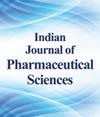pritimerin通过调节microRNA-936表达参与肺癌细胞对吉非替尼的耐药
IF 0.4
4区 医学
Q4 PHARMACOLOGY & PHARMACY
Indian Journal of Pharmaceutical Sciences
Pub Date : 2023-01-01
DOI:10.36468/pharmaceutical-sciences.1075
引用次数: 0
摘要
探讨普瑞替宁对肺癌细胞吉非替尼耐药的影响及其对microRNA-936的调控作用。体外培养肺癌细胞HCC827,建立肺癌吉非替尼耐药细胞HCC827/吉非替尼耐药,将HCC827/吉非替尼耐药细胞随机分为对照组、吉非替尼- l组、吉非替尼-m组、吉非替尼- h组、吉非替尼组、吉非替尼+吉非替尼组、吉非替尼+微rna -阴性对照组、吉非替尼+微rna -936组、吉非替尼+微rna +抗microrna阴性对照组和吉非替尼+微rna +抗microRNA-936组。采用3-(4,5-二甲基噻唑-2)-2,5-二苯基溴化四唑检测细胞增殖抑制率及中位半最大抑制浓度;采用定量逆转录-聚合酶链反应检测microRNA-936的表达量;transwell室法检测细胞迁移和侵袭。与HCC827细胞相比,HCC827/吉非替尼耐药细胞增殖抑制率显著降低,半最大抑制浓化值显著升高(p<0.05);与对照组相比,pritimerin - l组、pritimerin -m组和pritimerin - h组细胞增殖抑制率升高,半最大抑制浓度值降低,microRNA-936表达升高(p<0.05);与吉非替尼组比较,吉非替尼+ pritimerin组细胞增殖抑制率更高,迁移和侵袭细胞数量减少(p<0.05);与吉非替尼+microRNA阴性对照组相比,吉非替尼+microRNA-936组细胞增殖抑制率更高,迁移和侵袭细胞数量更少(p<0.05);与吉非替尼+pristimerin+anti-microRNA阴性对照组相比,吉非替尼+pristimerin+anti-microRNA-936组细胞增殖抑制率降低,迁移和侵袭细胞数量增加(p<0.05)。pritimerin可能通过上调microRNA-936的表达,抑制肺癌中吉非替尼耐药细胞的增殖、迁移和侵袭,从而增强细胞对吉非替尼的敏感性。本文章由计算机程序翻译,如有差异,请以英文原文为准。
Pristimerin Contributes to Gefitinib Resistance in Lung Cancer Cells by regulating microRNA-936 expression
To investigate the effect of pristimerin on gefitinib resistance in lung cancer cells and its regulation on microRNA-936. Lung cancer cell HCC827 was cultured in vitro , lung cancer gefitinib resistant cell HCC827/gefitinib resistant was established and HCC827/gefitinib resistant cells were randomly assigned to control group, pristimerin-L group, pristimerin-M group, pristimerin-H group, gefitinib group, gefitinib+pristimerin group, gefitinib+microRNA-negative control group, gefitinib+microRNA-936 group, gefitinib+pristimerin+anti-microRNA negative control group and gefitinib+pristimerin+anti-microRNA-936 group. 3-(4,5-dimethylthiazolyl-2)-2,5-diphenyltetrazolium bromide was used to detect the inhibition rate of cell proliferation, as well as the median half-maximal inhibitory concentration; the expression amount of microRNA-936 was detected by quantitative reverse transcription-polymerase chain reaction; cell migration and invasion were detected by transwell chamber assay. Compared with HCC827 cells, the proliferation inhibition rate of HCC827/gefitinib resistant cells was significantly lower and the half-maximal inhibitory concentration value was significantly higher (p<0.05); compared with the control group, the inhibition rate of cell proliferation was increased, the half-maximal inhibitory concentration value was decreased and the expression of microRNA-936 was increased (p<0.05) in pristimerin-L group, pristimerin-M group and pristimerin-H group; compared with the gefitinib group, the inhibition rate of cell proliferation was higher and the number of migration and invasion cells decreased in the gefitinib+pristimerin group (p<0.05); compared with the gefitinib+microRNA negative control group, the gefitinib+microRNA-936 group showed higher cell proliferation inhibition rate and lower cell number in migration and invasion (p<0.05); compared with the gefitinib+pristimerin+anti-microRNA negative control group, the cell proliferation inhibition rate decreased and the migration and invasion cell numbers increased in the gefitinib+pristimerin+anti-microRNA-936 group (p<0.05). Pristimerin may enhance cell gefitinib sensitivity by inhibiting proliferation, migration and invasion of gefitinib resistant cells in lung cancer by up regulating microRNA-936 expression.
求助全文
通过发布文献求助,成功后即可免费获取论文全文。
去求助
来源期刊

Indian Journal of Pharmaceutical Sciences
PHARMACOLOGY & PHARMACY-
自引率
0.00%
发文量
0
审稿时长
2 months
期刊介绍:
The Indian Journal of Pharmaceutical Sciences (IJPS) is a bi-monthly Journal, which publishes original research work that contributes significantly to further the scientific knowledge in Pharmaceutical Sciences (Pharmaceutical Technology, Pharmaceutics, Biopharmaceutics, Pharmacokinetics, Pharmaceutical/Medicinal Chemistry, Computational Chemistry and Molecular Drug Design, Pharmacognosy and Phytochemistry, Pharmacology and Therapeutics, Pharmaceutical Analysis, Pharmacy Practice, Clinical and Hospital Pharmacy, Pharmacovigilance, Pharmacoepidemiology, Pharmacoeconomics, Drug Information, Patient Counselling, Adverse Drug Reactions Monitoring, Medication Errors, Medication Optimization, Medication Therapy Management, Cell Biology, Genomics and Proteomics, Pharmacogenomics, Bioinformatics and Biotechnology of Pharmaceutical Interest). The Journal publishes original research work either as a Full Research Paper or as a Short Communication. Review Articles on current topics in Pharmaceutical Sciences are also considered for publication by the Journal.
 求助内容:
求助内容: 应助结果提醒方式:
应助结果提醒方式:


